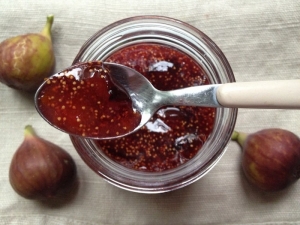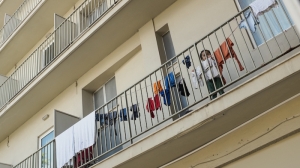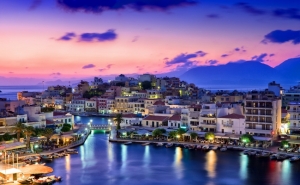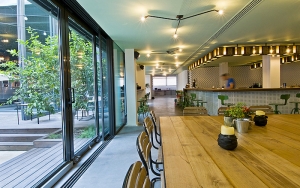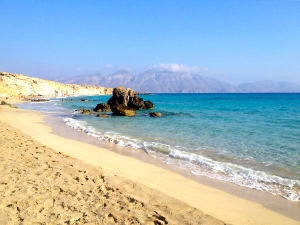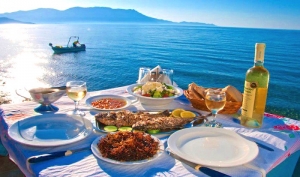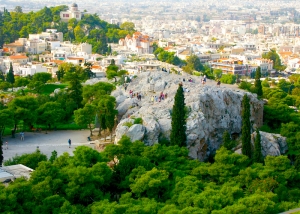COMMUNITY CORNER
XpatAthens
Monday, 23 July 2018 07:00
Greek Fig Jam
Good news; figs are finally in season! Make this easy fig jam recipe, which will go great with nuts, blue cheese, and prosciutto.
Ingredients
- 1 kg ripped figs, peeled and chopped
- 500gr caster sugar
- Lemon juice of one lemon
- 1 glass of water
To read the directions, please visit: Greece By A Greek
Published in
Greek Food & Diet
Tagged under
Tuesday, 27 September 2016 07:00
Greece Guest Of Honour At Moscow's International Book Fair
Greece was the recent guest of honour at Moscow’s recent 29th International Book Fair, which took place early September 2016 at Moscow’s largest exhibition center.
The Russian Federal Agency for Press and Mass Communication appointed Greece as the Guest of Honour on the occasion of the Joint Year Greece-Russia 2016, while Russia was in turn the Guest of Honour at the 13th International Thessaloniki Book Fair in May 2016.
Visitors had the chance to become acquainted with aspects of Greek culture as there were around 600 publications from 50 publishing houses, all representing the scientific and artistic side of Greece spanning from antiquity, the Byzantine era, the Enlightenment, 20th century, and modern day.
Prominent Greek writers and artists went to Moscow to participate in the programme of events, which included 30 events aimed at introducing the modern cultural face of a small country with a great history that maintains deep historical and cultural ties with Russia through literature, cinema, visual arts, and music.
The programme at Moscow’s International Book Fair was developed by the Hellenic Foundation for Culture with the collaboration and support of Cavafy Archive-Onassis Foundation, the State Museum of Contemporary Art, the Greek Film Archive, the Greek Film Center, Michael Cacoyannis Foundation, ASIFA HELLAS, Greekanimation.com, Greek IBBY, the Embassy of Greece to the Russian Federation, as well as with the Department of Byzantine and Modern Greek Studies of the Lomonosov Moscow State University.
To read this article in full, please visit: Greek News Agenda
To read this article in full, please visit: Greek News Agenda
Published in
Greece In The News
Tagged under
Monday, 26 September 2016 07:00
Refugees Turn Abandoned Hotel In Athens Into Peaceful Home
Activists and refugees have turned this abandoned hotel in the heart of Athens into a new community. The City Plaza hotel is now home to nearly 400 refugees stuck in Greece after the rest of Europe closed its borders to them. Their goal is to build a peaceful and supportive community.
For more information, please visit: Al Jazeera
Published in
Videos
Tagged under
Thursday, 22 September 2016 21:17
Qatar Airways Starts Flying A380 To Sydney Due To Increase In Passenger Demand
Sydney has become Qatar Airways’ first destination in Australia to be served by the super-jumbo A380 aircraft, just six months after it joined the carrier’s global network.
Following the route’s inauguration with the Boeing 777-300 on 1 March 2016, Qatar Airways has seen a steady growth in demand for its service on the route. The 517-seater A380 aircraft increases Qatar Airways’ current daily capacity by 44 percent on this route to meet the growing travel and trade demand.
Qatar Airways Group Chief Executive, Mr. Akbar Al Baker, said, “From the moment we inaugurated service to Sydney earlier this year, we have been welcomed with open arms. Customers flying to and from Sydney appreciate our global route network and our efficient flight schedules, which save them hours of time on the average itinerary. We are pleased to respond in kind with the introduction of the A380 service to Sydney, offering 517 seats per flight.”
Mr. Akbar Al Baker also said, “Qatar Airways brings travellers from Australia to more destinations in Europe, the Middle East and Africa than any other airline serving Australia today. Australia is one of the main hubs of the business world in Asia Pacific, with many passengers flying worldwide for business and leisure. What better way to serve travellers from this key destination than to introduce our iconic A380 to the country, starting with the nation’s biggest hub, Sydney.”
The 517-seat capacity is spread across twin decks in a tri-class configuration of eight seats in First Class, 48 seats in Business Class, and 461 in Economy Class, featuring world-class amenities and first rate services that set it apart from other aircraft. Passengers travelling from Sydney to London and Paris can enjoy the Qatar Airways A380 experience throughout their journey to these two European destinations.
“We’re thrilled that Qatar Airways has upgraded to an A380 within six months of the airline’s launch in Sydney, which is testament to their early success and strong loads,” Sydney Airport Managing Director and Chief Executive Officer Kerrie Mather said.
“Qatar Airways’ Doha to Sydney service already generates an estimated 3,000 jobs and contributes more than $240 million to the economy per year, plus it provides passengers with more choice and connectivity. Sydney Airport estimates that Qatar Airways’ A380 will deliver an incremental $78 million in inbound visitor expenditure annually to Australia, supporting the federal government’s target of doubling overnight visitor expenditure by 2020. On behalf of Sydney Airport, I’d like to congratulate Qatar Airways on this significant milestone and wish them continued success on the route.”
The A380 aircraft will feature a luxurious and exclusive First Class Cabin with ultra-wide seats, which automatically recline into a flat bed, two-passenger table extension dining, sleeper suits, flight slippers, and amenities from Giorgio Armani. Passengers travelling with Qatar Airways’ award-winning Business Class can also enjoy private aisle access with the 1-2-1 seat configuration and a suite of connectivity options including on-board Wi-Fi, keeping them fully connected while up in the air.
In addition, passengers in First and Business Class can relax and socialise in the on-board lounge located on the upper deck of the super-jumbo.
Economy Class passengers will also benefit with the added spaciousness of the A380, with higher ceilings on the main deck, a wider seat configuration and design to offer more leg room plus contoured headrests.
When transiting through Qatar Airways’ hub, Hamad International Airport in Doha, passengers travelling from Sydney can enjoy a comfortable and efficient transit. The luxurious and modern airport has more than 40,000 square metres of retail space and restaurants including more than 70 retail and 30 food and beverage outlets, as well as a 25-metre swimming pool, gym, hotel, and spa.
Daily Flight Schedule
Depart Doha QR908 at 21:40, arrive in Sydney at 19:35 (next day)
Depart Sydney QR909 at 22:25, arrive in Doha at 05:05 (next day)
About Qatar Airways
Qatar Airways, the national carrier of the State of Qatar, is one of the fastest growing airlines operating one of the youngest fleets in the world. Now in its 19th year of operations, Qatar Airways has a modern fleet of 190 aircraft flying to more than 150 key business and leisure destinations across six continents.
A multiple award-winning airline, Qatar Airways was awarded World's Best Business Class, Best Business Class Airline Lounge, and Best Airline Staff Service in the Middle East at the prestigious 2016 World Airline Awards managed by international air transport rating organisation Skytrax.
Qatar Airways is a member of the oneworld global alliance. The award-winning alliance was named the World’s Best Airline Alliance 2015 by Skytrax for the third year running. Qatar Airways was the first Gulf carrier to join global airline alliance, oneworld, enabling its passengers to benefit from more than 1,000 airports in more than 150 countries, with 14,250 daily departures.
About Qatar Airways
Qatar Airways, the national carrier of the State of Qatar, is one of the fastest growing airlines operating one of the youngest fleets in the world. Now in its 19th year of operations, Qatar Airways has a modern fleet of 190 aircraft flying to more than 150 key business and leisure destinations across six continents.
A multiple award-winning airline, Qatar Airways was awarded World's Best Business Class, Best Business Class Airline Lounge, and Best Airline Staff Service in the Middle East at the prestigious 2016 World Airline Awards managed by international air transport rating organisation Skytrax.
Qatar Airways is a member of the oneworld global alliance. The award-winning alliance was named the World’s Best Airline Alliance 2015 by Skytrax for the third year running. Qatar Airways was the first Gulf carrier to join global airline alliance, oneworld, enabling its passengers to benefit from more than 1,000 airports in more than 150 countries, with 14,250 daily departures.
For more information, please visit their website: Qatar Airways
Published in
International Travel
Tagged under
Thursday, 22 September 2016 07:00
Major Luxury Tourism Projects Across Greece Help Boost Economy
Foreign investors are placing their bets on Greek tourism with more than 3,200 new rooms in the works.
Experts say new accommodation units, most in the luxury category, as well as the accompanying services, will further boost the tourism sector and help the Greek economy.
Among the projects underway are Miriam Hellas in the Lassithi prefecture of Crete, which will be handled by a Russian-interests consortium. The project is budgeted at 408 million euros and involves the development of 850 acres of land near the popular Elounda area which will include 380 tourist homes, three five-star hotels as well as a marina, shops, wellness centers, restaurants and bars, athletic centers, and recreational parks.
Another is the Arabic-interests RSR Eagle Resort in Karystos, Evia, which will include some 400 tourism residences, hotels, a marina, and a conference center with a budget of 200 million euros.
To read this article in full, please visit: Greek Travel Pages
To read this article in full, please visit: Greek Travel Pages
Published in
Greece In The News
Tagged under
Thursday, 22 September 2016 07:00
48 Urban Garden - Dinner At The Gallery
A food truck in a restaurant? A cocktail bar with its own herb garden? A gallery that is all about fun? All this and more is the word at 48 Urban Garden, which filled in a small vacuum in the Athenian restaurant scene with its fresh, original and unaffected concept.
48 Urban Garden shares a roof with the Ileana Tounta Contemporary Art Center, with the two operating in conjunction with each other. The Airstream food truck located in the restaurant’s dining hall is not just a pretty piece of the décor, it serves as the kitchen. The dining area’s big windows look out onto an urban garden that enlivens the grey apartment blocks surrounding it. It is built on different levels and has picnic tables as well as herb patches and a lemon tree.
The food is inspired by street staples with a more creative and “restauranty” approach. Try the tuna tataki, spicy burritos, the beautifully roasted picanha beef and the rib-eye steak, a mix-and-match of the elements that define Asian and ethnic cuisines. Over at the bar, the cocktails are designed to complement the food, light and refreshing. The music is the cherry on the icing, bringing together the whole ambiance.
Telephone: 213 028 1866
Article Source: Greece Is
Published in
Restaurants In Athens
Tagged under
Tuesday, 20 September 2016 07:00
Unchartered & Uninhabited Island Destinations In Greece
Greece is made up of a half a dozen archipelagos making it easy to see how there are a plethora of amazing uninhabited islands around Greece that visitors can add to their list of places to visit on their next Grecian holiday!
Keros Island
Located northwest of Amorgos, Keros island is a part of the Koufonissia islands and boasts important archaeological sites and excavations. Archaeologist have uncovered ruins from the Early Cycladic period 3200-2000 BC and in ancient times, it was called Keria. The beaches have white sand and the water is turquoise. People may visit the island on their own boat or by hiring an excursion boat. Overnight stays are not permitted by the Archaeological Authority that watches over the island.
Lihadonisia
Lihadonisia is an island complex located across from Kamena Vourla in Evia. The islands are dotted with beaches that were created by volcanic inlets. Often referred to as the “Maldives” of Greece, the islands emerged as a result of a massive earthquake thousands of years ago and volcanic activity during the Cenozoic century. Thought to have been named after the servant of the God Hercules, Lihas, the islands can be reached via boat excursions operating from the harbor of Kavos in Evia.
Gramvousa
Gramvousa
Gramvousa is part of the Cretan islands archipelago. The two islands it refers to are Imeri and Agria Gramvousa, literally “tame” and “wild” Gramvousa. You can take a one day boat trip leaving in the morning and returning at night from Kissamos port and arriving at Gramvousa and Balos beach & lagoon. Day tours are available from May to October. Known for spectacular beaches, flora and fauna, and the remains of the Venetian castle and fort that tops Imeri Gramvousa peaks, these two islands are not to be missed.
To read this article in full, please visit: Greek Reporter
Published in
Travel Greece
Tagged under
Tuesday, 20 September 2016 07:00
3 Greek Islands Among List Of Places With Best Food In The World
Islands have always been associated in people’s minds with beautiful sandy beaches, palm trees, sun beds & summer cocktails. However, apart from all of that, the best islands in the world also offer delicious food!
An annual survey conducted by Travel + Leisure gave readers the opportunity to rank their favorite islands not only for their beaches, but also for the quality of restaurants and the food they provide.
The list consisted of 20 islands worldwide and among them were 3 Greek ones famous for their cuisine and fine dining.
Santorini gained 5th position in the list, followed by Mykonos and Crete!
The Travel + Leisure List for Islands with the Best Food
An annual survey conducted by Travel + Leisure gave readers the opportunity to rank their favorite islands not only for their beaches, but also for the quality of restaurants and the food they provide.
The list consisted of 20 islands worldwide and among them were 3 Greek ones famous for their cuisine and fine dining.
Santorini gained 5th position in the list, followed by Mykonos and Crete!
The Travel + Leisure List for Islands with the Best Food
- Nantucket
- St. Bart's
- Maui, Hawaii
- Sicily
- Santorini
- Maldives
- Harbour Island
- Capri
- Hilton Head
- Oahu, Hawaii
- Bali
- Mykonos
- Malta
- Mallorca
- Vancouver Island
- Florida Keys
- Golden Isles
- Crete
- Kauai, Hawaii
- Anguilla
Originally posted on ellines.com
Translated by XpatAthens
Published in
Greece In The News
Tagged under
Tuesday, 13 September 2016 06:14
Navarino Challenge 2016 Was Completed And Left Wonderful Impressions
Navarino Challenge 2016 was completed leaving wonderful impressions!
Thousands of participants from Greece and abroad took part in the richest schedule of activities ever presented by an event!
Navarino Challenge 2016 completed successfully for a 4th consecutive year, confirming its title as the top sports tourism event in Greece, offering unique moments and creating great memories to each participant!
More than 2,000 amateur and professional athletes, friends of sports of all ages (according to the updated results - the oldest athlete was 82 years old), embraced the event by participating in more than 15 activities in Messinia and Costa Navarino from 9 to 11 September 2016.
Navarino Challenge attracted the global interest with participants coming from countries as USA, Canada, Australia, Britain, Sweden, Denmark, France, Germany, Switzerland, Italy, South Africa, Ghana, Turkey, Bulgaria, Romania and Cyprus. Meanwhile, bookings at The Westin Resort Costa Navarino, ran extremely high during the weekend, on the occasion of the event, supporting thus the hotel & hospitality tourism and promoting Messinia as a destination worldwide.
For the third consecutive year, Navarino Challenge had the safety and dynamic support of Allianz Greece. The company which is sensitive to issues related to health care and supports reinforcing the message of health protection and the adoption of a healthier lifestyle through exercise and balanced nutrition, supported the event (with its numerous team). The company’s principles and values are inextricably linked with those of the organization.
On Friday, September 9, 2016, the schedule of Navarino Challenge included activities for those staying at The Westin Resort Costa Navarino, such as: aqua aerobic lessons for all and baby swimming (for children up to 3 years old) with the support of Swim Academy, of the Federal Swimming Coach, Nikos Gemelos and the Silver medalist and World Champion in open water swimming, Spyros Gianniotis, TaeKwonDo lessons from the twice silver Olympic medalist Alexandros Nikolaidis (with the dynamic participation of the teams from Kyparissia, Kalamata and the whole region of Messinia) pilates lessons by the physical education instructor, specialized in pilates, Mandy Persaki, kick boxing lessons by the kick boxing champion Alexandros Nikolaidis, climbing lessons (by the certified climbing instructor of Navarino Outdoors, George Malamas) and a beautiful bike ride at Voidokilia -with the support of both activities from Navarino Outdoors. At the same time there was also a 4on4 basketball tournament (with the support of basketblog.gr) and the participation of Olympic medalists, champions, media groups and VIP guests of the event, golf clinics with the support of Navarino Golf Academy and scuba diving with the support of the Aqua Divers Club and Scuba Hellas. During the weekend, participating athletes quenched their thirst with the Natural Mineral Water "Vikos" that contributes to the well-functioning of the body during sports.
On Saturday, September 10, 2016 morning, the weather being an ally (on a sunny day), the whole activity of the event was transferred in the Municipality of Pylos-Nestor, for the swim sports.
In the beautiful bay of Navarino at the picturesque port of Pylos, hundreds of friends of the sea had the opportunity to swim without competition, in the calm waters, covering the dreamy one mile (1.6 km) swimming route designed by Nikos Gemelos.
Meanwhile, the activity of Kids' Athletics was presented for the first time in Pylos Square by the ambassador of the event, the Olympic and World Champion in 400m. hurdles Periklis Iakovakis. The activity aimed at getting children acquainted with the track and field sports, as it has been developed and established by a special panel of scientists from IAAF (International Association of Athletics Federation) and is officially implemented in Greece by the Hellenic Athletics Federation (SEGAS) in cooperation with the Ministry of Education. Kids' Athletics included, among others, the activity of standing long jump, the sport of the world famous Olympic champion and legendary Kostis Tsiklitiras, who was born in Pylos Messinia.
For the third consecutive year, athletes and organizers moved with the safety and efficient engines of the cars of Ford Motor Hellas, the official supporter of Navarino Challenge.
Right after, within the same day, a Stand Up Paddling race by BIC® Sport took place for the first time in the event!
With the support of one of the most recognized brands in the world, BIC® company, present in the field of water sports with BIC® Sport since 1979, participants were divided into groups of beginners and professionals, covering the half mile and one mile routes respectively at the port of Pylos. All athletes had the opportunity to test the credibility of the SUP BIC® boards. Stand Up Paddling was held with the support of Surf Salad!
Mediterranean diet was highlighted by the food blogger Gogo Papadionysiou also known as Mamatsita who made traditional lalagia & diples with the assistance of local women and the team of Poseidonia restaurant in Pylos. The Mayor of Pylos-Nestor, Mr. Dimitrios Kafantaris awarded Spyros Gianniotis, Kelly Araouzou and Nikos Gemelos and offered them a tour at the home of Tsiklitiras in Pylos.
The “sea-day” was concluded with a demonstration race with 25 Optimist and 3 big open boats from Maritime Athletic Pylos Association “Nestor”, the Sailing Club of Kalamata “Poseidon” and the Sailing Club of Kalamata “Eolos” with the assistance of the Municipality Pylos-Nestor, the Port Authority of Pylos, Pylos Association of Enterprises for Tourism Development and Explore Messinia.
In the midday of Saturday, the action returned at The Westin Resort Costa Navarino! There, for the second consecutive year the boccia activity was presented, with the dynamic presence and support of the team of Allianz Greece (more than 90 people attended the demonstration of the sport). The ambassador and Gold Paralympic athlete of boccia, Grigoris Polychronidis greeted the event with its own private message, (as he was in Rio for the Paralympic Games), giving the pass for the demonstration of the sports to the athletes of the Greek boccia national team Christos Galaios (6th position in the European Championship) and Christos Kypriotis (Greek Champion) and the coach Jenny Rodiou and Evangelia Galaiou.
Saturday night ended in the most glittering and spectacular way, with the colors of the official airline partner of the event, Qatar Airways!
The cocktail “A Night to Remember by Qatar Airways”, was presented by the journalists Dimos Bouloukos and Dora Tsampazi. The evening moved into Swing, Jazz, Funk, Soul, Latin and Blues rhythms by Brandy Souare and included greetings, awards and many surprises for the honorees and high guests of the event.
The first award of the evening was given to the silver Olympic medalist and World Champion in open water swimming Spyros Gianniotis by TEMES S.A., Marketing & Business Development Director Mrs. Marina Papatsoni. The first surprise was announced, with the award of a set of business class airline tickets given to the silver Olympic medalist from the Commercial Director of Qatar Airways in Greece, Mr. Alexandros Michalopoulos. The World Champion in open water swimming, Kelly Araouzou was then awarded by Vikos SA Sales & Marketing Director, Mr. Konstantinos Sepetas. The event continued with the award given to the Federal Swimming Coach, Nikos Gemelos by the Chief Executive Officer of Allianz Greece, Mrs. Philippa Michali and the award which was given to the team of Allianz World Run (with the presence of Gerosideri Charis and Kafantari Dora who participated in the global initiative) by the Chief Executive Officer of Active Media, Mr. Akis Tsolis. Two more surprises were hidden next, to celebrate the four years of the event. National Geographic Channel team was awarded by the Co-Founder of Navarino Challenge & Director of Development of The Hellenic Initiative, Mr. Peter Poulos for its four years of support to the event as TV Communication Partner. The Commercial Director of FOX Networks Group, Mrs. Nadia Demiri received the relevant award, while Vargiamidis family was awarded by the ultramarathon Dean Karnazes for the four years of continuous participation in Navarino Challenge.
Immediately after that, the activity “Like for a good cause” was presented -that ran recently for the five best photos of the event chosen by the people through social media- and its charitable cause was revealed for the first time. The photographs selected were converted into canvasses and now these works will be auctioned through Charity Idols, where all revenue generated will be given to the humanitarian non-profit Foundation of the Professor Afksendiyos Kalagkos, Coeurs pour Tous Hellas - Hearts for All, which supports children with congenital heart disease. The event was welcomed by the President of the institution Coeurs pour Tous Hellas, Mrs. Anna Grimani and the Executive Committee Member at the Department of Communication, Ms. Ioanna Moundrea.
Further, another set of economy class airline tickets was drawn by Qatar Airways to a lucky couple, while throughout the duration of the “Navarino Challenge” the top airline ran another contest to the participants of the event.
The evening ended with the award given to the ultra-marathon Dean Karnazes by the Marketing Director of Ford Motor Hellas, Mrs. Petri Logara.
Navarino Challenge promotes the value of “a healthy mind in a healthy body” and the spirit of “fair play” adopting the purpose of the Olympic Movement, supported by Olympic athletes and Champions who educate youth through sport, without any discrimination. At the same time, the athletes inform them about the benefits of exercise and the Mediterranean diet and prompt the audience to support the cause of the fight against childhood obesity. Overall more than 800 children were actively involved in all activities of the Navarino Challenge weekend of!
Navarino Challenge was also supported by the Navarino Icons products, Michael & Trianthe Dakolias, Village Cinemas, the Inbi restaurant, the New Hotel and Surf Salad.
The interest of the people, that surpassed all expectations with their participation, peaked on the third and last day of the event, on Sunday, September 11th 2016. Runners of all ages, starting from Navarino Dunes in Costa Navarino ran to Pylos beach, crossing Voidokilia beach for the first time and following the trail mapped out, back in Homer’s years, by Telemachus, Ulusses’ ’ son, trying to find his missing father. The start was given early in the morning for the top Half Marathon (21,1km) -with the participation of Greek-American ultramarathon Dean Karnazes- and the 10 km route, while the 5km run followed (for running and dynamic walking). The running activity ended amid countless smiles from children who participated in the 1km, with the support of the natural mineral water “Vikos”. Routes were designed and edited by the former marathon runner, holder of national best performance on the classical route, running coach and director of All About Running, Nikos Polias. The teams of Messiniakos and Akritas had a strong presence on the running and then also in the activity of Kids’ Athletics with the ambassador Periklis Iakovakis.
Food blogger Mamatsita, with her second in a row cooking challenge, undertook to revitalize and support the participants in running by offering them traditional Messinian food in Costa Navarino with the support of Posidonia Restaurant.
Navarino Challenge presented a great innovation with the Navarino Challenge chatbot!
The MPASS company participated for the first time in the event and contributed to its success by creating the Navarino Challenge chatbot. This is a global innovation since this is the first sports tourism chatbot that gave participants the opportunity to have, instantly, automatic personal updates on offers and events, by sending just one message in the official Facebook page of Navarino Challenge. The most important was that someone was able, for the first time, to receive automatically his finish time, in any route he participated with a personal message on Facebook messenger, by simply typing his BIB number.
Navarino Challenge was held under the Auspices of the Greek National Tourism Organization and the Department of Nutrition and-Dietetics of Harokopio University of Athens with the support of Costa Navarino and The Westin Resort Costa Navarino, as well as the Municipalities of Pylos-Nestor and Trifilia. The event was included, for one more year, in the European Week of Sport with the #BeActive activity which is supported by the European Commission and the Greek General Secretariat of Sports.
The event was also assisted by the Health Runners Club of Messinia, ThaMa Restaurant, Alpha (Athlima SA), the Department of Sports Organization & Management from University of Peloponnese, Anazoe Spa Costa Navarino, 1morekm, Hellenic Athletics Federation (SEGAS), IAAF Kids Athletics, Diana “exoplizein” and Nargile while Vita N Travel was the official travel agent. The event was finally supported by the Hellenic Red Cross Sector of Samaritans, Rescuers and Lifeguards.
Official Sponsors: Allianz Greece, “Vikos” Natural Mineral Water
Official Airline Partner: Qatar Airways
Official Supporters: Ford Motor Hellas, BIC®, BIC® Sport, Navarino Icons, Michael & Trianthe Dakolias, Village Cinemas, Poseidonia Restaurant, Inbi, New Hotel, Surf Salad
Assisted by: Health Runners Club of Messinia, Pylos Association of Enterprises for Tourism Development, Maritime Athletic Pylos Association “Nestor”, Explore Messinia, Navarino Outdoors, Swim Academy, Aqua Divers Club, Scuba Hellas, Navarino Golf Academy, ThaMa Restaurant, Alpha (Athlima SA), Department of Sports Organization & Management from University of Peloponnese, Anazoe Spa Costa Navarino, 1morekm, Hellenic Athletics Federation (SEGAS), IAAF Kids Athletics, Apia, Diana “exoplizein”, Nargile
Official Travel Agent: Vita N Travel
Official Broadcaster: OTE TV
TV Communication Partner: National Geographic Channel
Under the Auspices of the Greek National Tourism Organization
Photo Credit: Elias Lefas
Official Airline Partner: Qatar Airways
Official Supporters: Ford Motor Hellas, BIC®, BIC® Sport, Navarino Icons, Michael & Trianthe Dakolias, Village Cinemas, Poseidonia Restaurant, Inbi, New Hotel, Surf Salad
Assisted by: Health Runners Club of Messinia, Pylos Association of Enterprises for Tourism Development, Maritime Athletic Pylos Association “Nestor”, Explore Messinia, Navarino Outdoors, Swim Academy, Aqua Divers Club, Scuba Hellas, Navarino Golf Academy, ThaMa Restaurant, Alpha (Athlima SA), Department of Sports Organization & Management from University of Peloponnese, Anazoe Spa Costa Navarino, 1morekm, Hellenic Athletics Federation (SEGAS), IAAF Kids Athletics, Apia, Diana “exoplizein”, Nargile
Official Travel Agent: Vita N Travel
Official Broadcaster: OTE TV
TV Communication Partner: National Geographic Channel
Under the Auspices of the Greek National Tourism Organization
Photo Credit: Elias Lefas
Published in
Local News
Tagged under
Monday, 19 September 2016 07:00
Top 10 Things To Do In Athens
Areopagus – The Hill of Ares
Just opposite the entrance to the Acropolis sits a huge white rock. Named after the Greek God of War, Ares, it’s thought that many murder trials were held here, including the trial of Ares himself for the murder of Alirrothios, the son of Poseidon. Climb either the marble stairs carved into the side or take the modern steel stairs (which is the best option to avoid slipping) and sit and admire the vista; Athens sprawls out below you with views of the sea and islands nearby.
Anafiotika
Under the northeastern side of the Acropolis lies a hidden “island village.”. In the early 1900s, many people came to Athens from the island of Anafi to build the king’s palace. They built themselves their own neighborhood, called Anafiotika, to remind them of their island homes. Today, only 45 of the original houses remain, but it’s amazing to wander through the winding streets and discover an island village that almost looks out of place within the heart of a city.
Vouliagmeni Lake
Visit the brackish waters of Vouliagmeni Lake, a natural lake formed many years ago from a cave collapse and surrounded by a natural pine forest. The lake is a mixture of warm fresh water and cold seawater and contains the garra rufa fish that nibble at your skin as you swim.
National Garden
Located behind the parliament building in Syntagma Square and designed by Queen Amalia in 1840, you’ll find a plethora of plant, bird and animal species at the National Garden. Open to the public, locals spend their afternoons here drinking coffee in the small cafes dotted around the garden and older men play tavil (Greek backgammon).
Day Trip to Cape Sounion
The Temple of Poseidon at Cape Sounion makes a perfect day trip from Athens. It’s about 42 miles southeast of Athens, but definitely worth it. Visitors can wander around the monument, which is surrounded on three sides by the Aegean Sea, and admire the breathtaking views across the water. Afterwards, relax on the beach below.
This article was originally posted on Onboard.com, which is no longer online.
This article was originally posted on Onboard.com, which is no longer online.
Published in
City Discovery
Tagged under

